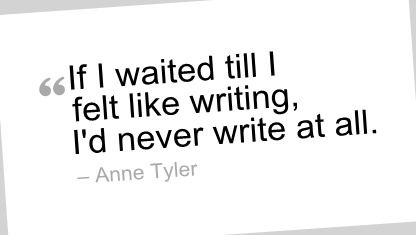 Just recently I received a ‘like’ on this blog and I reread it. I needed a reminder myself to keep writing.
Just recently I received a ‘like’ on this blog and I reread it. I needed a reminder myself to keep writing.
You would think with the coronavirus and shelter in place order, I would have plenty of time to write. Fact is, as many of you probably know, the news and everything else going on is consuming my waking hours. I need to recalibrate.
Maybe all those tips about writing every day and setting quotas was right. Not to say that you can’t take time off to enjoy a special evening or life, but you have to stay motivated or you will lose the desire, momentum, will to write.
- So I find myself going through articles on how to motivate yourself to write. Not sure why. I already know most of the tips by heart. I guess I’m hoping to find something new, a magic pill maybe. Well If there is one, I haven’t found it. So I guess I just have to fall back on the tried and true. Make a date with yourself to show up and write on a regular basis. It doesn’t have to be great. You just need to write.
- Choose the time of day that works best for you. In the morning after that first cup of coffee works best for me.
- Share your goals and dreams with family and friends. They will ask how it’s going and keep you in line.
- Cut off all electronics. This one is a given and to be honest, I have allowed myself to get sucked back into Facebook and other social media outlets over the last month. They are mind-numbing and can take precious time away from what is important. If you use them to communicate with family in other states, like myself, you need to schedule in time and watch the clock.
- Set a daily quota. To be honest I’ve never done that one. I do set a weekly quota. It allows me time for life to happen and is more realistic. Point is you need a goal, something to work towards to keep you moving.
- Record and keep up with your word count. It will serve as a timesheet and a reward system to praise yourself.
- Allow yourself to write badly. At least for early drafts be gentle on yourself. If you stop to judge, edit, delete and rewrite, you will be spending all your time playing reader or critic, not writer.
Something to think about
-Jan R


 When you hear the word setting, you think of a time period and place, but settings do so much more than that.
When you hear the word setting, you think of a time period and place, but settings do so much more than that.
 I’ve shared this blog before, but it’s been a while, and a message I think needs to be heard. As new writers, we sometimes listen to everybody but ourselves. Friends and critique partners mean well, but if you let them, some will try to take over your novel and mold it into what they think it should be.
I’ve shared this blog before, but it’s been a while, and a message I think needs to be heard. As new writers, we sometimes listen to everybody but ourselves. Friends and critique partners mean well, but if you let them, some will try to take over your novel and mold it into what they think it should be.
 If you’re new to the process, you’re going to make mistakes. I’ve made them all. Well, I haven’t tried to self-publish so maybe that was an over-exaggeration, but not by much:-)
If you’re new to the process, you’re going to make mistakes. I’ve made them all. Well, I haven’t tried to self-publish so maybe that was an over-exaggeration, but not by much:-)